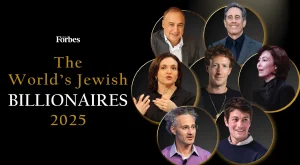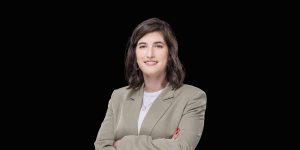Before reaching the age of 20, Liyam Chitayat started her Ph.D. at MIT, one of the leading academic research institutions in the U.S. and the world, and won the Hertz Fellowship for research excellence – the most prestigious fellowship for doctoral studies in the U.S.
But her life, too, took a turn at October 7. “I moved to the U.S. to start my research exactly two months before the war broke out”, she recounts. “On October 7, the ground was pulled out from under my feet, and on October 8, I couldn’t breathe. On Saturday, I found myself trying to understand where my family members and friends were – who was safe, who was hiding in a shelter, who was kidnapped, and who was gone. The next day, a student group, funded by MIT, had already sent a message to all students that the ‘Israeli apartheid regime’ was to blame for the massacre.
“The level of hatred towards Jews and Israelis on campus was unimaginable: a swastika drawing in the hallway, puddles of urine on the prayer room window, blocking the entrance to campus, threats to Israeli faculty members – Israelis at MIT had to endure it all.
“Out of the difficult and dark period in my life, I understood that I had to join the advocacy war from my place as an Israeli student in the U.S. In the week following the attack, I organized and spoke at events for the return of the hostages, protests against antisemitism, a memorial event for the murdered, and advocacy actions about the Nova massacre. I paid a heavy personal and professional price. Students on campus ignored me. Tens of thousands of comments on my videos accused me of war crimes. But it was important to spread the messages against pro-Palestinian propaganda”.
In Academia from Age 12
Despite her very young age, Liyam has been living academia for many years. She is a graduate of the Odyssey Future Scientists program. She began her undergraduate studies in chemistry and biology at Tel Aviv University at the age of 12, which she completed with highest honors as one of the 10 leading students in the Faculty of Exact Sciences.
In her undergraduate degree, she conducted research in immunology, for which she won the Singer Award for research excellence in chemistry. At the age of 14, she worked as an artificial intelligence researcher at Western Digital. From there, she continued to a master’s degree and developed microbiome engineering methods, which she published in two papers as first author. In the IDF, she served as an outstanding scientist in the biological engineering department at MAFAT and led projects in the fields of biology and artificial intelligence.
Quantum Leaps
“During my Ph.D., I’m working on creating cells within cells, aimed at expanding the capabilities and functions of biological systems”, Liyam explains. “The sensing capabilities and various functions that we as humans can achieve are limited by the chemistry that was available to living organisms billions of years ago. Today, scientific and technological developments have created a variety of chemical manufacturing and processing processes that are not accessible to living organisms. The way evolution occurs, and especially its pace, do not allow for the quantum leaps needed to enable living organisms to exploit all the capabilities we’ve discovered.
“I draw inspiration from the wonderful inventions that evolution has created, and ask how I could engineer the body and cells of the organisms around me to be able to absorb a wider range of colors and sounds, communicate in the infrasonic range or do photosynthesis.”
Liyam is also one of the founders of “Nucleate Israel”, an organization that operates inspired by and in cooperation with similar centers around the world, encourages entrepreneurship and connects Israeli students in biotechnology and medicine to focal points in the Israeli industry. In addition, she is the youngest member of the 8400 network of senior health technology executives in Israel.
What is your peak moment, as of now?
“Since always, my mother acted beyond all imagination to allow me to fulfill my dreams and aspirations. She supported me and believed in me, even when no one else did, and did everything she could despite being a single mother.
“The most significant peak point for me so far is the day when my mother opened my acceptance letter for the Hertz research fellowship. This fellowship is the most prestigious for doctoral students in the sciences, given to 15 doctoral researchers in science and technology across the U.S. based on exceptional achievements. The day she opened the acceptance letter was a moment when I could give her and show her how much I appreciate who she is and her role in my life”.





